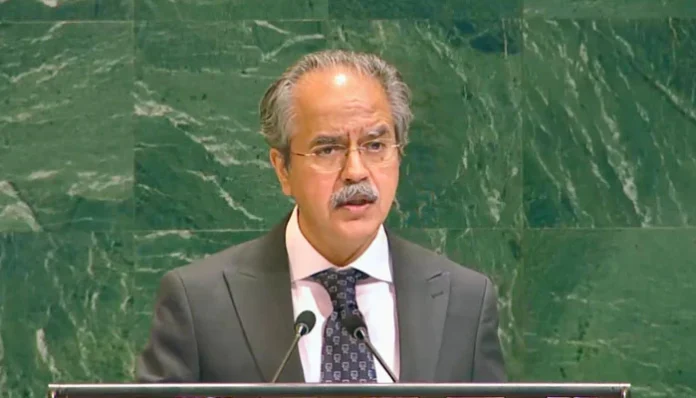Pakistan has once again called on the United Nations to ensure that Afghanistan does not turn into a breeding ground for terrorism, raising alarm over threats posed by groups like the Tehreek-e-Taliban Pakistan (TTP), Daesh, and others operating from Afghan soil.
Speaking at a UN General Assembly session focused on the Afghan situation, Pakistan’s Permanent Representative to the UN, Ambassador Asim Iftikhar Ahmad, stressed the urgent need to prevent terrorists from using Afghanistan as a base to target its neighbors and the wider region.
His comments come shortly after Pakistani security forces reportedly neutralized around 30 militants attempting to cross the Pak-Afghan border in North Waziristan. These individuals were allegedly backed by Indian interests.
Since the Taliban regained control of Afghanistan in 2021, Pakistan has seen a noticeable uptick in cross-border attacks, especially in Khyber Pakhtunkhwa and Balochistan. Just last month, a rise in terror incidents was observed even though tensions with India didn’t escalate into broader violence.
On the diplomatic front, Pakistan and Afghanistan recently held a high-level meeting in Islamabad, focusing on trade, transit, security, and regional connectivity. Both sides agreed that terrorism poses a major threat to peace in the region, but Pakistan emphasized the need for real action against militant groups operating out of Afghanistan.
Ambassador Iftikhar didn’t mince words, stating that groups like TTP—with nearly 6,000 fighters—continue to operate in Afghanistan’s ungoverned spaces and pose a risk not just to Pakistan, but to the entire world. He also pointed to evidence of collaboration between the TTP and other separatist groups like the Balochistan Liberation Army (BLA) and Majeed Brigade, targeting Pakistan’s key infrastructure and development projects.
“These groups are using modern weapons and advanced equipment to launch increasingly sophisticated attacks on our soil,” he warned, noting that such activities have intensified over the past two weeks.
Despite the security challenges, Pakistan continues to support the Afghan people. The ambassador highlighted how Pakistan has hosted millions of Afghan refugees for decades and has taken in another million undocumented individuals since 2021, which has led to domestic challenges.
He urged the global community to step up and share this burden. He also stressed the importance of reviving Afghanistan’s economy and banking systems—including unfreezing its financial assets—to encourage trade and investment.
Looking ahead, Pakistan reaffirmed its commitment to regional connectivity projects like TAPI, CASA-1000, the Uzbekistan-Afghanistan-Pakistan railway, and expanding CPEC into Afghanistan—all vital for regional peace and development.
Ambassador Iftikhar concluded with hope: “For the first time in over 40 years, Afghanistan has a chance at peace. But this can only happen if it’s inclusive, respects the rights of all Afghans, and rejects terrorism. The world must not abandon Afghanistan. Dialogue and engagement are the only path forward.”




